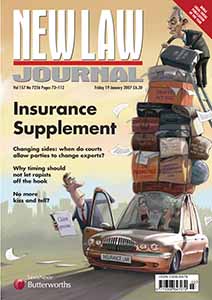
Why do we allow revenge and neglect to play such major roles in our justice systems?
In brief
Geoff Barrett and Martin Finigan highlight the dangers of relying on composite insurance
Steven Raeburn exposes the uneasy consequences of the baser elements of journalism
Lea Brocklebank considers the challenges facing insurance lawyers in 2007
In brief
Timing should not let rapists off the hook argues
Kjersti Lehmann
Dadourian Group International Inc v Simms and others
[2006] EWCA Civ 1745, [2006] All ER (D) 305 (Dec)
Dominic Thomas explains why the demand for environmental insurance is on the increase
MOVERS & SHAKERS

Fox & Partners—Nikki Edwards
Employment boutique strengthens litigation bench with partner hire
.tmb-mov69x69.jpg?sfvrsn=68413e46_1)
Fladgate—Milan Kapadia
Partner appointed to dispute resolution team

Carey Olsen—Louise Stothard
Employment law offering in Guernsey expands with new hire







